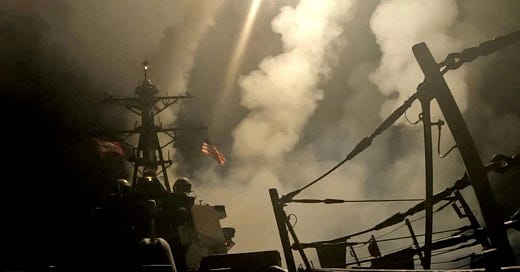It's Thursday – and yes, that means Hot Takes Happy Hour. On the menu: the escalation between India and Pakistan heats up. Meanwhile, Trump just made peace with the Houthis faster than you can say "art of the deal," apparently forgetting to CC Israel and our Gulf allies on the memo. And who knows what will happen before we meet at 5:30 ET.
If you have been watching us these last few weeks, you know and I don’t always see eye to eye. But we have a vibe: Argue, laugh, analyze, and sometimes, magically, sync up. The critical factor is respect, honesty, and a genuine desire to understand each other’s viewpoint. That’s the way it should be, and as usual, debate goes best with a cocktail in hand.
Haven't subscribed to What the Hell is Going On? Do it now. As I have said before, Dany is as sharp and biting as the lemon twist in your martini.
This week Donald Trump delivered one of the starkest expressions of "America First" foreign policy since he took office. No diplomatic niceties, no pretense of regional stability, not even a courtesy call to allies – just raw transactional dealmaking that protects American interests while leaving regional partners to fend for themselves against Iran-backed militants.
With a single Oval Office announcement that blindsided even his own Pentagon officials, Trump declared a ceasefire with the Iran-backed Houthi militants and ended a costly seven-week bombing campaign that had drained over $1 billion from American coffers. The deal is breathtakingly straightforward: the Houthis stop attacking American ships, America stops bombing Yemen. Everyone else? You're on your own, kids.
"They just don't want to fight," Trump declared with the casual confidence that has become his diplomatic signature. "And we will honor that and we will stop the bombings. They have capitulated, but more importantly, we will take their word. They say they will not be blowing up ships anymore."
Yes, you read that correctly. The same Donald Trump who once vowed to "completely annihilate" the Houthis is now taking at face value the promises of an Iranian-backed militia whose slogan literally includes "Death to America" and who were firing missiles at Israeli civilian targets just days ago. The same group that, when not attacking international shipping, has spent years turning Yemen into the world's most dire humanitarian catastrophe.
The terms of the Omani-brokered agreement couldn't more nakedly embody Trump's transactional approach to foreign policy. The Houthis agree to stop attacking American ships; in exchange, the U.S. halts its bombing campaign. But conspicuously missing from the deal? Any protections whatsoever for Israel or Gulf Arab states — the very allies who have suffered most from Houthi aggression and remain squarely in the militants' crosshairs.
Mohammed Abdulsalam, the chief Houthi negotiator, made this crystal clear, telling Reuters: "The agreement does not include Israel in any way, shape or form." Senior Houthi official Mahdi al-Mashat went even further, promising that the group's response to Israel's bombing of Sanaa's airport would be "earth-shattering, painful, and beyond the capability of the Israeli and American enemy to bear."
Israeli officials were caught completely flat-footed by Trump's announcement. They weren't even informed of the deal before it was announced publicly — a remarkable diplomatic slight that occurred just hours after the U.S. military had provided protection for an Israeli strike in Yemen. One minute the U.S. is coordinating military operations with Israel; the next, it's cutting a separate peace that leaves Israel exposed.
The agreement also abandons Saudi Arabia and the United Arab Emirates — nations that have endured years of Houthi missile and drone attacks targeting their cities and infrastructure. These are the same Gulf nations Trump is scheduled to visit next week in search of massive investment deals. Talk about awkward timing. Nothing says "strategic partnership" like showing up on your allies' doorstep just days after unilaterally washing your hands of a shared security threat.
Let's be honest about what's happening here. The American campaign against the Houthis had grown painfully expensive since Trump ramped up operations in mid-March. Over 1,000 targets struck, seven MQ-9 Reaper drones lost at roughly $30 million apiece, and two aircraft carrier battle groups (with one F/A-18 fighter jet already lost to an accident) deployed to the region. The Pentagon was bleeding resources with little to show for it.
By cutting a deal that protects only American interests, Trump extricated the U.S. from what threatened to become another "forever war" in the Middle East — the exact kind of entanglement he promised voters he would avoid. The calculation was brutally simple: America's vital interest is the safety of its own vessels, not regional stability or the security of allies who, in Trump's view, should handle their own problems.
"We hit them very hard. They had a great capacity to withstand punishment," Trump acknowledged, adding with jarring admiration: "You could say there's a lot of bravery there."
This remarkable praise for a group the U.S. officially designates as terrorists reveals much about Trump's worldview. He respects strength and resilience, even in adversaries, perhaps more than he values traditional alliances or shared democratic values. It's the same instinct that has led him to express admiration for strongmen like Putin, Kim Jong Un, and Xi Jinping.
Trump's Houthi deal isn't an isolated decision — it's part of a coherent strategy of American disengagement from regional conflicts that don't directly impact core U.S. interests. We've seen this pattern in his administration's unprecedented direct talks with Hamas over hostages and its pursuit of a nuclear deal with Iran — both initiatives proceeding with no Israeli involvement or consultation.
When asked about Houthi pledges to continue attacking Israel despite the U.S. agreement, Trump didn't even pretend to care: "I'll discuss that if something happens." He then immediately pivoted to Iran, describing the moment as "crunch time" for nuclear negotiations.
The message couldn't be clearer: Regional conflicts will be compartmentalized, with America addressing only those aspects that directly impact its interests. Everything else becomes someone else's problem. It's America First taken to its logical conclusion — a superpower that acts exclusively in its narrow self-interest, without the pretense of upholding a broader international order.
To fully appreciate how radical this latest shift is, we need to understand the rollercoaster of U.S.-Houthi relations over the past several years.
Since 2014, when the Houthis seized control of Yemen's capital, U.S. policy has oscillated wildly. The Obama administration initially backed Saudi Arabia's military campaign against the group. Under Trump's first term, the Houthis were designated a terrorist organization. Biden reversed that designation in 2021 as part of efforts to facilitate humanitarian aid into Yemen, only to redesignate them as terrorists in January 2024 after they began attacking ships in the Red Sea.
For years, Saudi Arabia and the UAE have been on the receiving end of Houthi missile attacks. After the October 7, 2023 Hamas attack on Israel, the Houthis began targeting Israel and commercial shipping in what they claimed was solidarity with Palestinians in Gaza. This prompted an international naval coalition and eventually, under Trump, a massive bombing campaign.
Now, with the stroke of a pen, Trump has essentially told these nations: your security challenges with the Houthis are your own to solve. For Gulf states that have spent hundreds of billions on American weapons systems and hosted U.S. military bases for decades, this represents a seismic realignment.
Trump's upcoming May 13-16 trip to Saudi Arabia, Qatar and the UAE now has all the makings of a supremely uncomfortable diplomatic encounter. Imagine walking into the royal palace in Riyadh or Abu Dhabi and trying to secure trillion-dollar investment deals with the same leaders you just left vulnerable to continued Houthi attacks.It's like breaking up with someone by text and then asking to borrow their vacation home the following weekend.
The Saudis and Emiratis have spent years trying to extract themselves from the Yemen quagmire. They've pursued their own separate peace with the Houthis, and even restored diplomatic relations with Iran in 2023 in a deal brokered by China. But they did so expecting the American security umbrella to remain in place.
Officials across the Middle East are quickly recalculating their security equations in light of the deal. If Trump's non-belligerency pact truly only shields American vessels, any plans for coordinated operations against the Houthis are effectively dead on arrival.
"This is actually the textbook definition of America First," one senior diplomat in the region told me, requesting anonymity to speak candidly. "They're not attacking us. So not our problem."
The diplomat noted that Trump would often point to the expensive U.S. campaign to neutralize the Houthi threat as doing Europeans and Arabs "a favor and we're not getting anything out of it. So it was always going to be short-lived,"
This diplomat ended our conversation with an ominous prediction: "Maybe if someone gets attacked, the response will be different." Left unsaid but clearly implied: attacks on regional allies' ships, infrastructure, or citizens will likely be met with American indifference.
As Trump pivots toward nuclear negotiations with Iran, a more pressing question looms large: who can guarantee that any agreement satisfactory to Washington will safeguard its allies’ security interests? The Houthi deal provides a sobering preview.
Regional powers must now confront an America that prioritizes its narrowly-defined national interests with unprecedented directness — where traditional allies find themselves downgraded from essential partners to supporting actors in America's strategic calculations.







Did Trump get a broad agreement with the Houthis on commercial shipping?
It is quite clear that no ally can trust Trump. Just like he dropped the Kurds during his first term, he appears to drop Israel now.